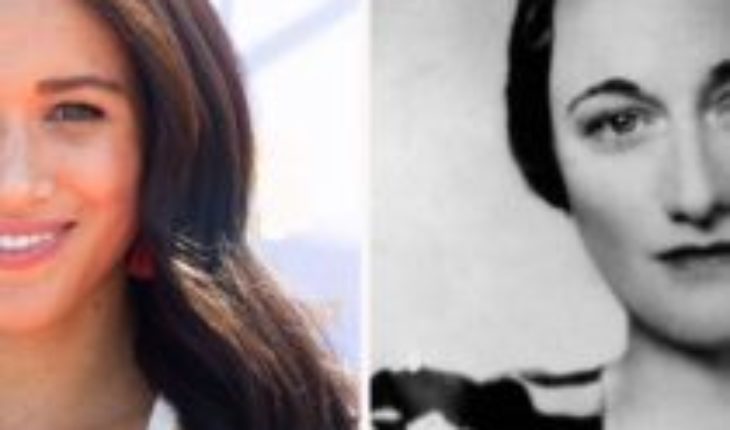
But is the comparison valid? It could be, if the Duke and Duchess of Sussex end up repeating the tormented exile of those who came to be known as the Duke and Duchess of Windsor.
In December 1936, the king left his throne and an empire of 500,000 subjects so that he could marry a woman who was divorcing her second husband.
Virulent public opinion launched against the king’s fiancée, Wallis Simpson, could come to touch a fiber of the newest American woman in marrying a member of the British monarchy.
An “ordinary adventurer”
Wallis at 22, when she was married to Lt. Wingfield Spencer, and when she allegedly learned “legendary Chinese skills” in a shantian brothel.In addition to being condemned as an uphesise of a middle-class neighborhood in Baltimore, USA Simpson was demeaning as an ordinary adventurer, a lesbian, a nymphomaniac, a Nazi spy and even hermaphrodite.
They portrayed her as a sexual sorceress who had supposedly learned “legendary Chinese skills” at the Shanghai brothels, where her first husband, the U.S. Navy pilot Wingfield Spencer, was stationed.
But the media attacks on Simpson didn’t just happen in the press.
Reporters on the British tabloid Daily Express threw bricks through the windows of the house Wallis Simpson leased in London’s posh Regent’s Park neighborhood, as later acknowledged by the newspaper’s owner, Lord Beaverbrook.
As the crisis of abdication loomed, Simpson fled to France, pursued by reporters across the country to Cannes.
She evaded that “voracious besieged army,” as she described them, in car chases and sometimes sneaking out of bathroom windows.
Eduardo and Wallis Simpson ended up increasingly bitter about the treatment they received. Anne Sebba, author of “That Woman, the Life of Wallis Simpson,” says Harry and Meghan’s decision to abandon their royal duties is not approaching in terms of constitutional seismic shock, as Simpson was accused of nearly destroying the monarchy and the British Empire.
“We are not living in 1936 when people were terrified of a divorced woman,” Sebba told the BBC.
“They thought it would be the herald of an evil society where everyone would get divorced,” he says
“But, actually, the big difference is that Edward was king and Harry is sixth in line to the throne – he will never be king.”
Simpson received sacks full of letters with hate fults, many of those misogynists.
In his memoirs he wrote: “There are few improperides applied against my sex that were not found in my daily mail”
News of the abdication caused shock beyond the UK.but some argue that the loudest insults came from other women.
According to Hugo Vickers’ biography, “Behind closed doors, the tragic and unknown story of Wallis Simpson,” Queen Elizabeth had said: “The two people who have caused me the most trouble in my life are Wallis Simpson and Hitler.”
Following in that same tonic, a friend from Simpson’s childhood, Mary Kirk – who ended up marrying the royal consort’s deceived second husband Ernest Simpson – wrote in her diary of the then-rival: “I think of her as other people think of Hitler, a force of the Not good… full of animal malice.”
Princess Margaret (queen Elizabeth’s sister) referred to her uncle’s mistress as “that horrible woman.”
The popular narrative that survives is that Eduardo – as Harry is said – was a pusillanimous man manipulated by an ambitious and demanding lover.
But, despite Simpson’s reputation as “the woman who stole the king,” Edward always found that royal duties were unbearably tedious.
Like Meghan and Harry, Edward dreamed of escaping and living in Canada.
Alan “Tommy” Lascelles, his private assistant, recalled a long conversation with then Prince Edward in which he realized that “words like ‘decency’, ‘honesty’, ‘duty’, ‘dignity’ and so on meant absolutely nothing to him.”
The royal counselfound concluded that he was “a ruined archangel.”
Endless existence
As Harry and Meghan navigate a new route, they will no doubt try not to get carried away by the kind of purposeless existence that the Duke and Duchess of Windsor conducted.
Apart from Edward’s temporary tenure during World War II as governor of the Bahamas, neither he nor his wife returned to work.
Olivette Otele, the first British black history teacher, points out that while Meghan has been a successful actress, activist and social blogger, Simpson never had a single job in her life.
“One was a woman of society,” says the University of Bristol professor, “the other, a successful, independent woman who supported herself with her own income.”
Professor Otele believes that “the veiled and open racist attacks” against the Duchess of Sussex, who is mixed race, is another reason why it is “completely absurd” to make a parallel between the two women.
“Wallis Simpson, naturally mistreated by the British press,” Otele argues, “but never to the same extreme (as Meghan).”
The British press has been more hostile against Meghan, says Olivette Otele, professor of black history at the University of Bristol.Eduardo and Wallis spent the rest of their years inside a fantasy court in exile, surrounded by the emblems of royalty, living at the expense of rich friends.
Just like Harry and Meghan, Eduardo and Wallis rubbed shoulders with the Hollywood show, inviting film stars such as Richard Burton and Marlene Dietrich to retire in the French countryside.
Eduardo had little to do other than play golf. He claimed not to regret anything about his 11-month reign, though his stories often began with the words: “When I was king…”.
He accused everyone except himself of his abdication, from then-Prime Minister Stanley Baldwing to the Queen Mother.
“For 20 years I worked for my country and they kicked me out of my ass,” the bitter duke told a friend.
Perhaps the worst irony of all of the supposed idyllic romance of the century is that most biographers agree that Eduardo set aside his crown for a woman who never really loved him.
During the long evenings the Windsors spent together, they poured themselves whiskey after dinner and “had nothing to say to each other so the contents of the tick slowly went down, down, down,” recalled his private secretary, John Utter.
In the end, “they had nothing to say to each other,” revealed a former private secretary to the couple. According to Andrew Morton’s book, “Wallis in Love,” Simpson’s heart really belonged to his friend, Herman Rodgers, a rich man, a yale University graduate.
The Duchess is said to have made the astonishing confession to Rodgers’ second wife on her wedding day, in 1950.
The Windsors were also upset with their fading fame.
Charles Pick, editor of the Duchess’s memoir “Reasons Has the Heart,” published in 1956, says that when he held the first meeting to discuss his book, Simpson rose from a divan to complain about being moved from the front pages by Marilyn Monroe.
In 1966, the Duke and Duchess took a train to Vienna, Austria, and grumbled over the paparazzi they hoped to find by hanging around the site of their destination.
However, an assistant noted that they could not hide the disappointment when no photographer appeared.
End to “real” name
A new life for Harry and Meghan in the semi-exile. Harry and Meghan now announced that they will leave the “SussexRoyal” (SussexReal) brand in mid-2020 that distinguishes their popular Instagram accounts and the couple’s website.
They will retain their titles as Duke and Duchess of Sussex, but not the so-called “real.”
The BBC correspondent covering British royalty Jonny Dymond sees the measure as a setback.
“‘SussexRoyal’ is their public face, their brand, a name that makes them hugely popular on social media,” Dymond says.
But the word “real” could not survive next to their private lives.
Archie was baptized in a private ceremony, which excluded the press and the public. Now that Harry and Meghan embark on a semi-exile, they may well have some words of advice from William Shakespeare in mind.
In his work “Henry IV, Part One,” the king rebukes his son, Prince Harry, for evading his duty and suggesting that he “commits his majesty to the unlikely saltimbanquis.”
“For you have lost your prerogative of prince,” the monarch reproaches his heir. “There are no eyes that aren’t enough to see you.”





